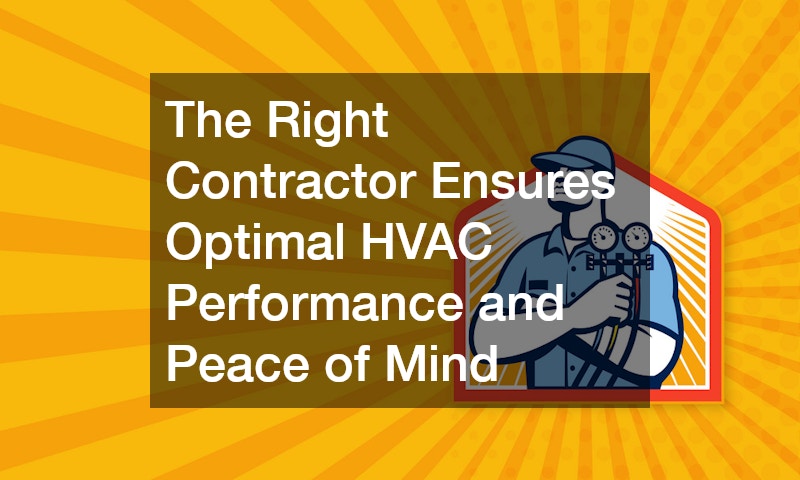In this article, we will explore the essential qualities that set dependable HVAC contractors apart. Understanding these attributes can help ensure that you hire a professional who will provide high-quality service, up-to-date solutions, and dependable support for your heating, ventilation, and air conditioning needs.
What Certifications and Licenses Should Reliable HVAC Contractors Have?
Importance of State and Local Licenses
Possessing valid state and local licenses ensures that HVAC contractors are compliant with regulatory laws and industry standards. These licenses are crucial as they confirm the legal authority to perform HVAC work, thereby safeguarding against potential legal issues.
Licensed contractors are more likely to adhere to safety protocols, minimizing risks during HVAC installations and repairs. Homeowners can rest assured that the contractor is vetted and recognized by official licensing boards.
When dealing with HVAC systems, hiring an unlicensed practitioner could result in subpar work and could potentially void warranty agreements. Thus, licenses provide a basic assurance of quality and trustworthiness.
Industry Certifications to Look For
Industry certifications, such as NATE (North American Technician Excellence) certification, reflect a contractor’s commitment to maintaining a high level of competence. These certifications are important indicators of a contractor’s expertise in specific HVAC systems.
With certifications, contractors demonstrate their knowledge of the latest technological developments and environmental regulations. Such qualifications help ensure that the work performed is both effective and energy-efficient.
Certified contractors are required to stay updated with continuing education, reassuring customers that they are receiving service from someone conversant with current industry best practices. Therefore, industry certifications are significant markers of reliability and professionalism.
How Do Experience and Reputation Influence Reliability?
Assessing Years of Experience
A contractor’s years of experience in the industry can greatly reflect their ability to navigate and solve a wide array of HVAC issues. Experience allows contractors to hone their skills and handle complex situations with ease.
Experienced contractors are not only familiar with routine installations but also with unforeseen challenges that might surface. This adaptability and depth of knowledge can save both time and money in the long run for clients.
In addition, a long-standing presence in the industry often correlates with better problem-solving capabilities, which are vital for efficient and long-lasting HVAC solutions. Customers can gain confidence in contractors who have sustained operations over many years.
Reading Reviews and Testimonials
Online reviews and customer testimonials offer valuable insights into a contractor’s reliability and quality of service. They reflect honest feedback and provide a glimpse into real-world client experiences.
A contractor with numerous positive reviews is more likely to meet or exceed customer expectations. Feedback forms a credible judgment of a contractor’s professionalism, punctuality, and work quality.
However, it is important to critically evaluate reviews and seek a balanced perspective from multiple sources. By doing so, clients can make informed choices and recognize patterns in a contractor’s service delivery.
Why is Proper Insurance Coverage Critical for HVAC Contractors?
Types of Insurance Coverage Needed
Proper insurance coverage, including liability insurance and workers’ compensation, is vital for protecting both the contractor and the client from unforeseen events. Liability insurance acts as a safety net, covering any accidental damage or injury during HVAC work.
Workers’ compensation insurance ensures that workers are safeguarded against on-site injuries, preventing financial liability from falling on the client. These coverages contribute significantly to a contractor’s reliability, as they offer peace of mind during projects.
Moreover, having adequate insurance aligns with professional business operations, demonstrating that a contractor takes customer safety and satisfaction seriously. It’s a fundamental requirement for any reputable HVAC professional.
Verifying Insurance Validity and Coverage
It is essential for clients to verify a contractor’s insurance validity and coverage before proceeding with any work. Confirming these details ensures that the contractor is prepared for any potential mishaps.
Clients should not hesitate to request insurance proof and clarify the extent of coverage offered. A reliable contractor will provide this information willingly and transparently.
Ensuring correct and current insurance is a critical step in selecting a dependable HVAC contractor. It helps prevent unpleasant surprises and financial uncertainties during a project.
What Role Do Customer Service and Communication Play in Contractor Reliability?
Importance of Clear Communication
Clear communication between the contractor and client can prevent misunderstandings and ensure project alignment. Reliable contractors are skilled at articulating project details, timelines, and expectations.
Effective communication allows for questions to be addressed promptly and accurately, fostering a cooperative work environment. Clients value this clarity, as it shapes their overall experience positively.
Moreover, honest and open communication establishes trust, which is a cornerstone of successful contractor-client relationships. It assures clients that their concerns are heard and valued.
Evaluating Customer Service Quality
High-quality customer service is a hallmark of reliable HVAC contractors. A contractor’s approach to customer service can significantly impact client satisfaction and the overall project experience.
Contractors who prioritize good customer service often deliver consistent follow-ups, adhere to deadlines, and are attentive to client needs. This level of service enhances the likelihood of repeat business and referrals.
Clients can assess customer service quality by noting a contractor’s responsiveness, willingness to address issues, and professionalism in interactions. These factors contribute to a contractor’s reputable standing in the industry.
By understanding and considering these top qualities, homeowners and businesses can make informed decisions when choosing an HVAC contractor. The right contractor not only exemplifies these qualities but also provides peace of mind and ensures optimal performance of HVAC systems.





